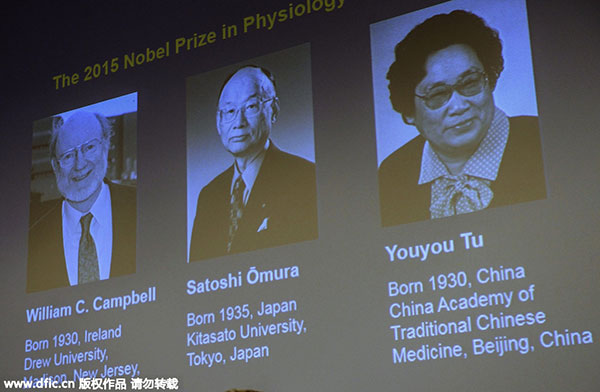|
 |
|
William Campbell, Satoshi Omura and Youyou Tu jointly won the 2015 Nobel Prize for medicine for their work against parasitic diseases, the award-giving body said on Monday. Irish-born Campbell and Japanese Omura won half of the prize for discovering a new drug, avermectin, that has helped the battle against river blindness and lymphatic filariasis, as well as showing effectiveness against other parasitic diseases. The Chinese scientist Youyou Tu was awarded the other half of the prize for discovering artemisinin, a drug that has significantly reduced the mortality rates for patients suffering from malaria. [Photo/IC] |
"It's a virtue to remain indifferent to honor or disgrace."
The old Chinese saying should be the best footnote on the landmark chapter when Tu Youyou became China's first Nobel laureate in medicine. This Nobel Prize that the Chinese have dreamed of for so long is an important international recognition of Chinese medical staffs' contribution to the world, so the Chinese have good reason to be proud of it. Tu was awarded the prize because she discovered Artemisinin in a health project in the 1970s, which effectively helped the worldwide battle against malaria.
However, the prize should not be a yardstick with which to evaluate China's academician system. Academicians in China refer to the most senior members of the Chinese Academy of Sciences and Chinese Academy of Engineering.
After the announcement of the prize, many challenged the existing academician system. As a medical researcher without a doctor's degree, international experience or the title of academician, Tu was first to bring Artemisinin to the project, first to extract it and first to carry out clinical tests.
No doubt the existing academician system is far from perfect, especially against the background of economic transformation that stresses research and innovation. The comprehensive reform plan made in the Third Plenum of the 18th CPC Central Committee in 2013 also made it clear that the academician system should reform the selection procedure, subjects and age limits.
It's a pity that Tu has not been elected as an academician, and the academician system should recruit more senior members who make great scientific contributions in different areas. But it will be wrong to consider Tu's award as a slap in the face to China's academician system.
The academician system has made a major contribution to China's economic growth, scientific and technological progress as well as the development of the defense industry. And China has advanced in research on quantum communication, neutrino, stem cells and high-performance computers, no matter whether Nobel Prizes are awarded to Chinese or not.
The United Kingdom, United States, Russia and Sweden have academician systems much longer established than China. Many don't have a chance to stand in the spotlight as a Nobel Prize winner, either. But that doesn't hinder them to make great achievements in their own countries.
The Nobel Prizes always spark controversies because of the committee's "secret selection procedures" and according to many renowned scientists the awards, established in 1895, can't match the rapid development of science today.
No doubt a Nobel Prize is a huge honor. We should be proud of Tu, but it will be fussy to dwarf our own academician system.
